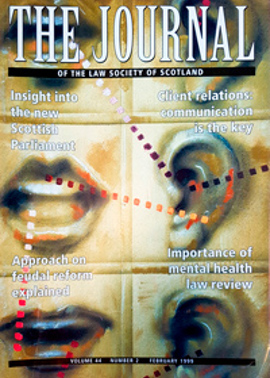Revised guideline: closing dates/notes of interest
[Note important changes from previous Guidelines]
Following publication of the revised Guideline on Closing Dates and Notes of Interest in the Journal of June 1998 (page 43) a number of representations were received from Members which have now been considered by the Professional Practice Committee. The Committee agreed to amend the Guidelines by removing the possible contradiction between paragraphs 1 and 2. The Committee adhered to the view that the closing date system has been successful and that a Practice Guideline remains appropriate. The Committee accepted that it is neither able to change the law nor to impose moral values on the public. The Committee also decided that a solicitor acting for a seller who accepts a note of interest from a prospective purchaser’s solicitor has not given an implied undertaking that the prospective purchaser will be given an opportunity to offer. That part of the earlier Guideline has therefore been deleted.
The full text of the amended Guideline is as follows:
Closing Dates: Selling solicitor
There is no legal requirement on a selling solicitor to fix a Closing Date when more than one interest is noted. Selling solicitors are entitled to accept their client’s instructions to accept an incoming offer without having a Closing Date and without giving other parties who may have noted an interest an opportunity to offer although every effort should be made to give them such an opportunity if at all possible. If, however, in acknowledging a Note of Interest the selling solicitor has given an undertaking to the prospective purchaser’s solicitor that they will be given an opportunity to offer, the selling solicitor should withdraw from acting if the client insists on taking a different course of action.
Where possible when fixing a Closing Date, the client should be advised to make him/herself available to consider the offers received. If this is not possible (e.g. Executries, Trusts, Companies etc.) prospective offerers should be told this when being advised of the Closing Date.
In taking instructions from the selling client to fix a Closing Date, solicitors should advise the client that, although not bound to accept the highest - or indeed any - offer, if the client instructs the solicitor to enter negotiations with a view to concluding a bargain with a party who has submitted an offer at the Closing Date, the solicitor will not be able to accept any subsequent instructions to enter negotiations with or accept an offer from another party unless and until negotiations with the original offerer have fallen through. Unsuccessful offerers should, of course, be advised as soon as possible after the Closing Date of the situation.
In the event of the selling client subsequently attempting to instruct the solicitor to discontinue such negotiations in order solely to enter into negotiations with or accept an offer from another party the solicitor should decline to act further in the sale unless the client reconsiders and adheres to the original instructions.
Where, at a Closing Date, two or more offers are received in terms that are such that they cannot be distinguished by the selling client, the solicitor may revert to those offerers and give them equal opportunity to revise their offer.
These Guidelines apply equally to solicitors acting as estate agents as well as solicitors acting in the conveyancing. Different considerations may apply, however, to sales of commercial property and to sellers owing statutory or fiduciary duties to others.
Solicitors acting for prospective purchasers
Where a prospective purchaser instructs the solicitor to submit an offer at a Closing Date, the solicitor should advise the client that if the offer is unsuccessful the solicitor will not be able to accept subsequent instructions to submit a revised offer or formal amendment unless expressly invited to do so by the seller’s agent.
In the event of an unsuccessful prospective purchaser subsequently attempting to instruct the solicitor to submit a revised offer or formal amendment after a Closing Date has passed and without an express invitation by the seller’s agent, the solicitor should decline to implement those instructions. The solicitor may accept instructions to intimate to the seller’s agent that in the event of negotiations with the successful party falling through, the prospective purchaser would be willing to enter negotiations, but no indication of any increased bid should be given.
Solicitors acting for purchasers who have received a verbal or qualified acceptance - whether following a Closing Date or not - should advise clients that although an initial acceptance may have been given by the seller, the contract will not be binding until Missives are concluded.
Notes of interest
Solicitors acting for prospective purchasers should advise their clients that noting an interest will not guarantee the clients an opportunity to offer, and if the clients are not in a position to put in an early offer they may not be allowed an opportunity to submit an offer at all.
Where a Closing Date has not been fixed the selling solicitors should advise their clients of any offers received - whether before or after negotiations with another prospective purchaser have commenced - and should intimate that the clients are entitled, but not obliged to accept the second offer notwithstanding that an acceptance may have been given to another prospective purchaser either verbally or in qualified form in writing.
The seller’s solicitor is entitled, but not obliged, to withdraw from acting if the seller wishes to withdraw from the acceptance of the earlier offer.
In this issue
- How the Scottish Parliament will work
- A review of mental health law - at last
- Abolition of the feudal system
- Interview: Sandra Dickson
- How to deal with complaints
- Who wants a happy client?
- Searching questions about managing risks
- Revised guideline: closing dates/notes of interest
- Code of Conduct for Criminal Work
- Scottish Solicitors' Discipline Tribunal






